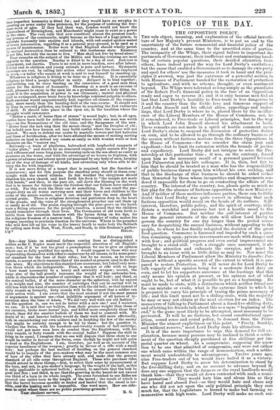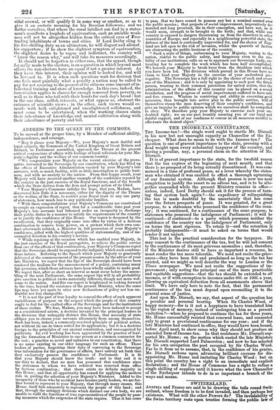TOPICS OF THE DAY.
THE OPPOSITION POLICY.
THE sole object, meaning, and explanation of the official investi- ture of her Majesty's present Ministers, is to put an end to the uncertainty of the future cominereial and financial policy of the country, and at the seine time to the unsettled state of parties. The incapacity of the Whigs, their signal failure in important de- partments of Government, their inefficient and contaminating hand- ling of certain popular questions, their decided alienation from others, have indeed paved the way for Lord Derby's exaltation ; but the cause that enabled a Government so to damage its own party and spoil for others' use the measures it took in hand and the prin- ciples it avowed, was just the existence of a powerful section in both Houses of Parliament banded for the restoration of protection to agriculture, and with no scheme, thought, or even sentiment beyond. The Whigs were tolerated so long simply as the guardians of Sir Robert Peel's financial policy in the face of an Opposition ready and eager to reverse it ; and it is only because men feel at last that Lord Derby's hostility to Free-trade is less dangerous to it and the country than the feeble love and timorous support of Lord John Russell and his official allies, upperlings and under- lings, that Lord Derby is where he is, placed there by the inciiffer- ewe of the Liberal Members of the House of Commons, not, be it remembered, to Free-trade or Liberal principles, but to the way in which Lord John Russell showed his attachment to both. These remarks are not made in a spirit of hostile comment upon Lord Derby's claim to suspend the discussion of protective duties on corn, and to be allowed to go through the ordinary business of the session without factious motions from the three Oppositions in the House of Commons—for we consider the claim just and expedient—but to limit its extension within the bounds of justice and expediency. Lord Derby did not intrigue to seize the Pre- miership at this particular time ; it was, on the contrary, forced upon him as the necessary result of a personal quarrel between Lord Palmerston and his late colleague. It is, then, but fair to him that he should be treated as a man who has the responsibility of public business thrust upon him without his own seeking, Ina that in the discharge of that business he should be aided rather than thwarted by those whose incapaeities and disagreements ren- dered it impossible for them to go on conducting the affairs of the country. The interest of the country, too, pleads quite as much as fair play for.the absence of factious opposition to the new Ministry. And if neither of these motives influence parties, there can be little doubt that Lord Derby was quite correct in affirming that such factious opposition would recoil on the heads of its authors. Srlf- interest, therefore, public policy, and the spirit of courtesy, alike dictate a watchful and anxious but not a hostile mood to the House of Commons. But neither the self-interest of parties nor the general interests of the state will allow Lord Derby to govern the country for one day longer than the period neces- sary for despatehing the annual business, without appealing to the people, to whom he has finally relegated the decision of the great food question. Commerce is harassed and impeded by such a ques- tion remaining open ; private investments are made with danger and with fear ; and political progress and even social improvement are brought to a stand-still. tzuch a struggle once announced, it ab- sorbs the attention and exhausts the energies, and must be brought to an issue with as little delay as may be. Nor must the Liberal Members of Parliament allow the Ministry to dissolve Par- liament without a specific avowal of the extent to which it is pre- pared to restore Protection. It will never do for Lord Derby to talk vaguely of his opinion being for a moderate fixed duty on corn, and to let his supporters announce at the hustings that this only means his opinion at present, or his opinion not of what ought to be, but of what it is possible to get as a beeinning. He must be made to state, with a distinctness which neither friend nor foe can mistake or evade, what is the extreme limit to which he is prepared to carry his principle of taxing the prime necessary of life ; and thisRmit must not be a sliding-scale, with the majority he may or may not obtain at the next election for an index. The manceuvre of talking to Parliament about a fixed five-shilling duty, and of letting his friends talk about this as a mere "beginning of the end," is the game most likely to be attempted, most necessary to be prevented. It will be no factious, but sound constitutional oppo- sition, sound sense and sound policy, to demand from the Prime Minister the utmost explicitness on this point. "Freely, frankly, and without reserve," must Lord Derby state his ultimatum.
It is of the more importance to urge this demand for full ex- planation, because many persons may be inclined to think a settle- ment of the question cheaply purchaaed at five shillings per im- perial quarter on wheat As a compromise, supposing the ques- tion to be one that admitted of compromise, and were not rather one which came within the range of demonstration, such a settle- ment would undoubtedly be advantageous. Twelve years ago, i
nine Free-traders out of ten would have hailed t as a victory. But suppose Lord Derby to avow his determination to stand by ling
the five-shil duty, and on no account to advance beyond it,
does any one suppose that the farmers or the rural landlords would thank him—that they would sit down contented with such a nomi- nal protection ? They would hate him and abuse him as they have hated and abused Peel—as they would hate and abuse any one who did not act upon the only political principle they care much for, that the Legislature is bound to make bad farming re- munerative with high rents. Lord Derby will make no such sin- cidal avowal, or will qualify it in some way or another, so as te give it an esoteric meaning for his Bceotaan followers; and we flatter ourselves, that where the rural intellect can find in a states- man's manifesto a loophole of equivocation, such an amiable weak- ness will not be altogether hidden from the critical eyes of Free. trading inhabitants of towns and cities. If Lord Derby cling ti Ins five-shilling duty as an ultimatum, he will disgust and alienat, his supporters; if he show the slightest symptom of equivocation, the slightest desire to be vague and indistinct, the country will "know the reason why," and will take its measures accordingly. It should not be forgotten in either case, that the appeal, though formally made to the electors, is on a question in which beyond most others the non-electors have an equal if not a greater interest. As they have this interest, their opinion will be looked for, and will be listened to. It is when such questions wait for decision that one feels most painfully what a penalty a nation may be called to pay for not securing to the poorest of its citizens some amount of in- tellectual training and store of knowledge. In this case, indeed, the lamentation applies to classes far enough removed from poverty, as well as to those who toil with their hands for each day's bread : but in the one class, selfish interests, or what appear so, obstruct the entrance of scientific views ; in the other, such views would co- incide with both enlightened and unenlightened selfishness, and must come to be entertained, when the working classes claim their inheritance of knowledge and mental cultivation along with their :nheritance of poverty and toil.



























 Previous page
Previous page